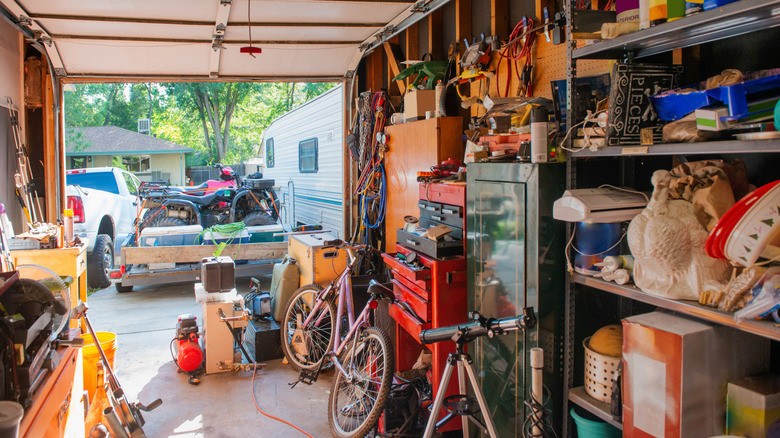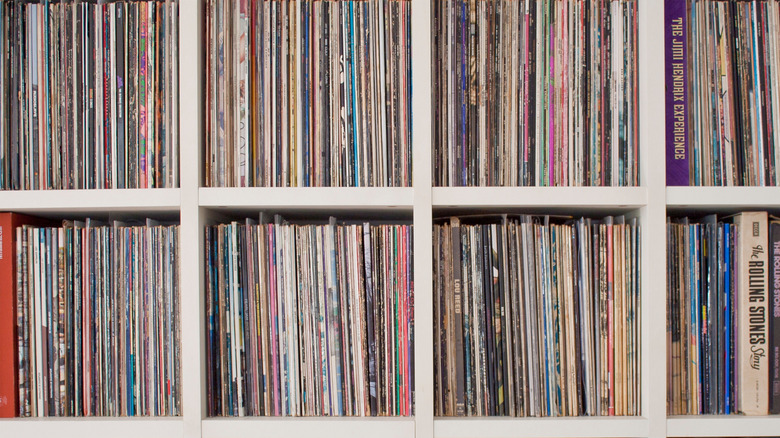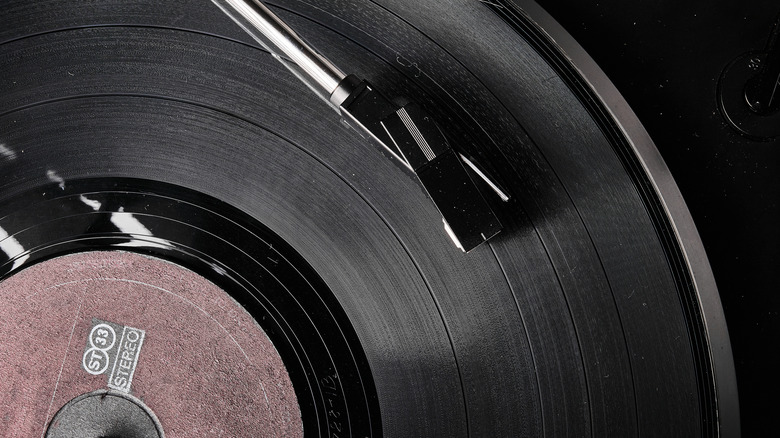Why You Should Never Store Vinyl Records In Your Garage
A University of Arizona study posits that humans collect things, from vinyl records to coins to action figures, to assert some control over their environment. Whether you subscribe to this theory or not, collecting things seems to be a universal human behavior. Vinyl record albums are a favorite collectible, and it's not just vintage vinyl that people are holding onto. In fact, 50% of the Americans who buy vinyl don't even own a record player. Storing those records correctly, particularly rare or uncommon albums, is critical. Even if you're crunched for space, keeping them in your garage should never be an option.
Vinyl records need conditions that protect their physical integrity and sound quality. Records warp, the grooves can be damaged, and their sleeves are susceptible to mold, mildew, and insect damage once their protective shrink wrap is opened or removed completely. The changing environment in your garage and its susceptibility to invasion from bugs and rodents make it one of the worst places to store your collection, even if you keep your garage storage organized.
Why the garage is the wrong place to store your vinyl records
Records warp when high heat causes the vinyl to soften or if the humidity is too high and causes uneven swelling. The heat and humidity in your garage, even if it's attached to your house, fluctuates throughout the year. Summertime, with its high temperatures and elevated humidity, is especially brutal for records stored in a garage. Uneven weight causes records to warp when they're stacked in boxes, which could also be an issue if you're shoving them in the garage for long-term storage.
You may not even notice the damage to an album's protective cardboard sleeve if your albums are stored in boxes, but insect damage will ruin their value and appearance. Any paper-loving bug will munch on the sleeves, and the cardboard box you've carefully stored your collection in is also a treat for insects like silverfish and beetles. Not all insect damage is caused by chewing. Some, like roaches, leave a trail of feces across the sleeve. If your garage has a pesky rodent problem, you could experience even more vinyl damage. While potential for damage to the record itself is low, rodents will happily attack the sleeves, either to eat or to make nests with.
The right way to store your record collection
Your record collection, whether you value it for vinyl's sound quality or because you're a completist who needs every variation on your favorite band's records, will last a long time with proper storage. It should be kept in a room with a fairly constant, moderate room temperature, ideally 65 to 70 degrees Fahrenheit. Humidity should be between 40% and 50%. High humidity causes mold and swelling while lower humidity causes brittleness.
Records should be kept out of direct sunlight and dusty air. Before you put vinyl records back into their sleeves, give the surface a light wipe with an anti-static brush or cloth. Store your records upright, ideally in shelving units that can hold the weight of the records without sagging. Make sure you don't have to force the record into the shelf space to avoid warping.
There are budget-friendly buys that make vinyl storage simple, no matter where you want to keep them. Buy inner and outer protective sleeves if your records are valuable or if you want to maximize protection. Archival-quality inner sleeves reduce static. Outer sleeves protect the album's decorative cover from fading and from receiving water damage. They're made from sturdy plastic and have a flap you can fold over the opening in the original sleeve.


